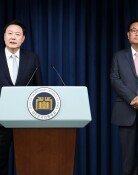S. Korean government puts forward budget bill with biggest deficit
S. Korean government puts forward budget bill with biggest deficit
Posted September. 02, 2020 07:35,
Updated September. 02, 2020 07:35
The South Korean government voted for the 2021 budget bill of 555.8 trillion won at the Cabinet meeting held on Tuesday. The size of the new bill is 8.5 percent bigger than last year’s, which was considered to be a super inflated budget. As the estimated income for the next year almost remains the same, the gap between total income and total spending will increase to a negative 8.2 percentage point. To fill such a gap, the budget bill includes a plan to issue deficit-financing bonds worth 89.7 trillion won, which is the largest figure in history.
A bold inflated budget seems somewhat unavoidable to address the COVID-19 issue. As both export and domestic markets have been heavily affected by the pandemic, government spending should play roles to promote economic recovery with a “Korean New Deal” and help the vulnerable, including those who are unemployed or run small businesses.
What’s problematic, however, is that while spending on non-essential and non-urgent items should logically decrease in the case of unexpected increased spending due to economic emergency, the new budget bill was designed in the opposite way. The budget bill – which should be focused on providing support to maintain and create jobs, promote domestic consumption, and protect the vulnerable groups – is largely composed of new populism projects irrelevant to addressing the economic challenge in hand.
For example, the comprehensive provision of free high-school education would be implemented from next year, which is a year earlier than scheduled, and covering haircut costs and increasing wages for those serving in the military are among many plans that could be delayed. The government also set budget to hire 30,000 new public officials according to its plan to increase the total number of public officials by 174,000 within its term, which deserves a question whether this is the right time to spend the government budget on such a non-pressing issue.
While the expanded roles of the government budget are important in the face of economic crisis, the increasing debt of the country is also worrisome. The 40 percent ratio of government debt over GDP, which was considered as the psychological threshold until the current administration, has been surpassed a long time ago. With this year’s main budget and three rounds of the supplementary budget, it already stands at 43.5 percent. According to the new budget bill, the figure will rise to 46.7% next year and is expected to reach 58.3% by 2024, which is similar to major European countries. The rapid disruption of the country’s fiscal health, which is the foundation for the stable operation of the national economy and foreign credit rating, should not be neglected anymore.
As the government itself pointed out, the national budget for 2020 and 2021 should be operated in line with the economic emergency. Bold adjustments, such as maintaining or reducing spending on items for universal welfare benefits and those irrelevant for economic recovery, should be made to make more resources available for items related to the COVID-19 crisis. The government budget bill is now in the hands of the National Assembly. I hope that the members of the National Assembly show a caring attitude for people’s livelihood and future generations with a sense of urgency during the budget review process, rather than a one-sided ruling party and a powerless opposition party as seen in the provisional session of the National Assembly.
Headline News
- Med professors announce intention to leave hospitals starting Thursday
- Bridge honoring Sgt. Moon Jae-sik unveiled in Pennsylvania
- Chief of Staff Chung tells presidential secretaries to stay away from politics
- US FTC bans noncompete agreements
- N. Korea launches cyberattacks on S. Korea's defense companies







